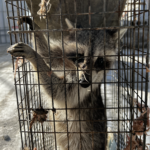Raccoons are interesting creatures that are known for their mischievous behavior and distinctive black and white masks. However, it’s important to remember that raccoons can also carry diseases that can be transmitted to humans and pets. Two of the most common diseases that affect raccoons are rabies and distemper.
Rabies is a viral disease that affects the central nervous system of mammals, including raccoons. It is transmitted through bites or scratches from an infected animal, or through the saliva of an infected animal coming into contact with a person’s or pet’s mucous membranes or open wounds. Rabies is a serious and potentially deadly disease that requires immediate medical attention.
Symptoms of rabies in raccoons can include aggression, confusion, difficulty walking, and difficulty swallowing. However, it’s important to note that not all raccoons with rabies will display these symptoms. In fact, some raccoons with rabies may seem tame and approach humans, which is why it’s important to avoid contact with wild raccoons.
Distemper is a viral disease that affects the respiratory, gastrointestinal, and central nervous systems of mammals, including raccoons. It is transmitted through direct contact with an infected animal or through the air. Distemper is not typically transmitted to humans, but it can be transmitted to unvaccinated pets.
Symptoms of distemper in raccoons can include fever, discharge from the eyes and nose, coughing, and difficulty breathing. Raccoons with distemper may also exhibit neurological symptoms such as tremors, twitching, and seizures.
It’s important to remember that both rabies and distemper can be serious and potentially deadly diseases, and it’s important to avoid contact with wild raccoons to reduce the risk of infection. If you suspect that you or a pet may have been exposed to a raccoon with rabies or distemper, it’s important to seek medical attention as soon as possible.









